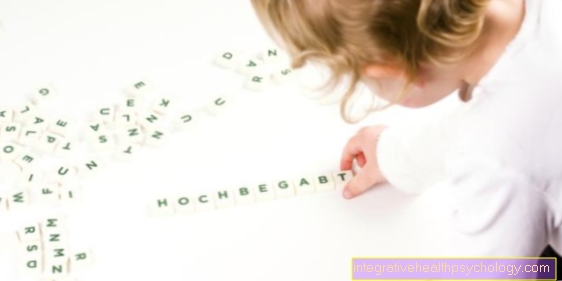
Achiever, underachiever, narcissism, Poor concentration, Lack of motivation, talent, high talent, special talent, genius, special talent, high intelligence, highly intelligent, highly gifted, high performance, partial performance disorder, Dyscalculia, Dyslexia, ADS, ADHD.
English: highly gifted, highly talented, endowment, giftedness.
From a scientific point of view, giftedness is understood to mean the potential ability to achieve high intellectual achievements. A prerequisite for this, in turn, is a high level of general intelligence, which is characterized by extraordinary information absorption and processing, as well as extraordinary skills in the area of thinking and problem solving.
$config[ads_text1] not found
Since giftedness cannot be visualized directly, this is done using an intelligence test. If the result is around or above a value of 130, it is assumed that they are gifted. However, this does not necessarily mean that giftedness is symptomatic or reflected in performance.

Only the correct interplay of high intellectual ability to think (IQ greater than / equal to 130), creativity (for example when solving problems), perseverance and motivation to achieve
Performance is based on different components and is influenced by many aspects or side effects. Due to these influences, giftedness can go undetected. Especially in connection with a ADS or ADHD, or with a Dyslexia or Dyscalculia remains one Giftedness possibly undetected.
In addition, there are highly gifted people whose academic performance as such would not indicate giftedness. Such gifted people are referred to in technical terms as “Underachiever”.
To what extent genetic dispositions (= individual factors) really train is in a special way of the External factors that significantly influence these dispositions. Even if a person can only lose their intelligence through illness, the level of training depends crucially on the accompanying factors (family, domestic support, friends, ...).
Do the side effects sound familiar to you? Read more about "Giftedness in adults'
To an existing Giftedness are to be funded Concentration games particularly advisable.
For this purpose, we have developed a game in combination with a game manufacturer, which can playfully promote giftedness.
Through the combination of concentration and play, various goals can be achieved very well.
We particularly value the high quality and workmanship of this game.

Underachievers are those highly gifted children who, despite being highly intelligent (IQ from 130), do significantly worse at school than their normally gifted classmates. There are different definitions of when one can speak of a so-called underachievement. Even a highly gifted person can be considered an underachiever with an average grade below 3.0. However, the limit can also be variable and relate to the performance compared to the age group (school performance below 25% of the age group, etc.)
$config[ads_text3] not found
All definitions agree on the fact that despite a generally high level of intelligence, school performance is worse than the intelligence test would suggest.
$config[ads_text2] not foundAccording to the current state of research, it is assumed that only a minority of the gifted can be classified in the underachiever category.
Underachievers often manifest themselves through massive behavioral problems, which are exemplified in the following list. The list does not claim to be complete and only serves to illustrate possible problems by way of example.
Read more: Therapy and help for children and adolescents with behavioral problems
Underachievement - typical symptoms
Personal qualities:
Work behavior:
Social behavior:
It is difficult to infer a highly talented underachiever based on the symptoms. As a rule, underachievers are also often considered to be problematic students, but a giftedness is rarely suspected behind the problems. The high talent of underachievers is not reflected in the score.
$config[ads_text4] not found
Suspicions that could indicate a possible underachievement
It is therefore advisable to consult a psychologist if you suspect an underachievement, who will examine your intellectual abilities using an intelligence test. Due to the (possible) symptoms of an underachiever described above, it is advisable to be sensitive to the child and not directly express any suspicions (avoidance of pressure to perform).
Count to underachievers
Not
those gifted children who suffer from a partial performance deficiency (dyscalculia or dyslexia).
The causes that can be blamed for underperformance at school are different and equally complex. As a rule, the underachievement is a sign that the course of development is / was unfavorable or is / was influenced unfavorably. Thus, all factors come into play that prevent the gifted from converting their intellectual abilities into (school) performance. As a result, the causes often lie in the child itself or in the child's immediate environment (family, friends, school, peers ...).
Permanent excessive or insufficient demands can also influence the development of the underachievement.
The narcissistic personality disorder is a clinical picture which, in the case of the gifted, especially in the case of achievers (performance corresponds to intellectual abilities) or overachievers (better performance than they would be expected to do on the part of intellectual abilities) as a result of their permanently good to very good performance and the reaction of the environment to this performance in Appearance can occur.
According to the DSM - IV (Diagnostic and Statistical Manual of Mental Disorders) the disorder begins in early adulthood.
$config[ads_text1] not foundRead more about the here narcissistic personality disorder:
High intelligence is no guarantee that sub-areas cannot be affected by poor performance.In unfavorable cases, this can also mean that talents remain undiscovered.
Partial performance weaknesses such as dyscalculia and dyslexia can also occur in gifted people. As the name suggests, in such cases only a part of learning, reading and writing or arithmetic, is affected by a weakness.
Highly gifted children and adolescents with partial performance deficits are therefore not underachievers, but only have problems in a school area.
Read more about the subject areas of partial performance weaknesses here:
Gifted children and teenagers can also have trouble concentrating and paying attention. Inner restlessness and lack of concentration are often the result, but this is not always a sign of being under-challenged.
The simultaneous occurrence of giftedness and ADD, or giftedness and ADHD is possible. In order to recognize and differentiate this, specific observations must be made.
In the diagnostic delimitation of ADS or ADHD, the intelligence of a child is usually determined by an intelligence test. However, if ADD / ADHD is not recognized, a corresponding “double diagnosis” is much more difficult. You can find out more about the diagnosis of ADD or ADHD on the following pages:
In addition, there are other symptoms (characteristics) that we have summarized below.
AD (H) S and giftedness
-
typical symptoms
Here you will find further information on the topic of the Giftedness:
More information about Problems with learning can be found at:
$config[ads_text2] not found
A list of all the topics that we have published under our "Problems with Learning" page can be found at: Problems with learning A-Z